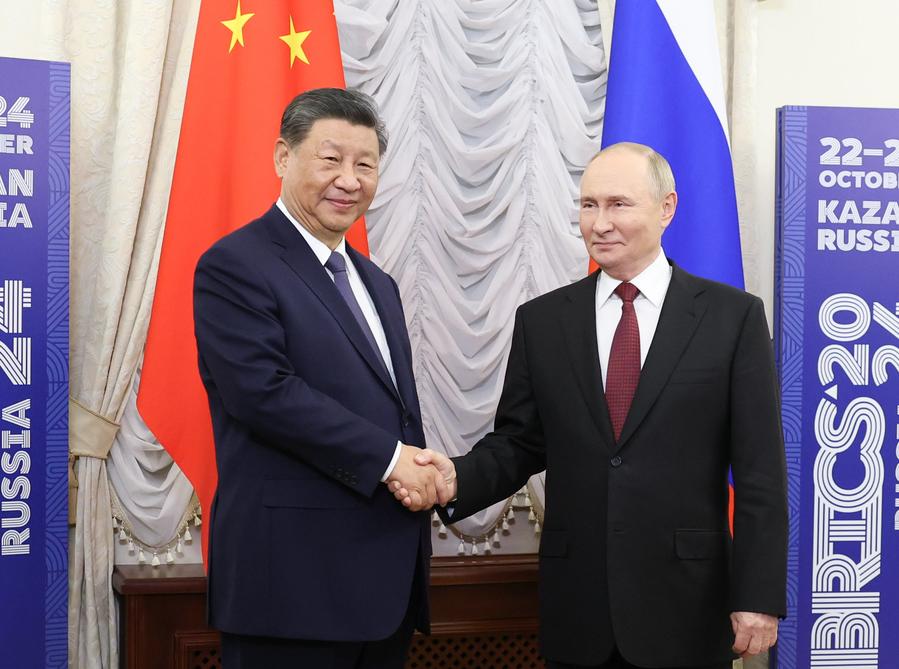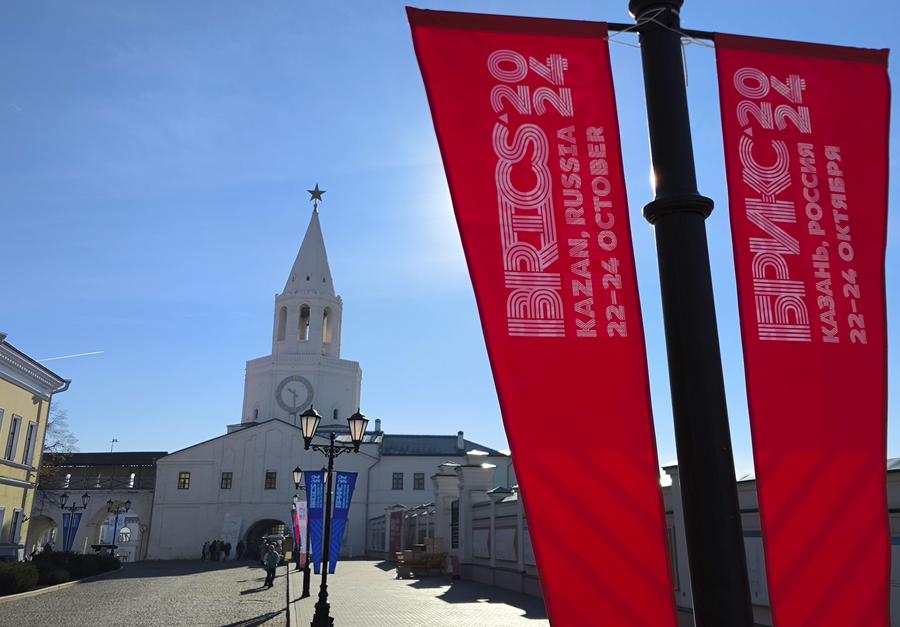Feature: Tea connects China, Russia, Xi tells Putin

Chinese President Xi Jinping meets with Russian President Vladimir Putin in Kazan, Russia, Oct. 22, 2024. (Xinhua/Ding Haitao)
KAZAN, Russia, Oct. 23 (Xinhua) -- "Around 400 years ago, the Great Tea Road that connected the two countries went past Kazan, through which tea leaves from China's Wuyi Mountain region found their way into many Russian households," Chinese President Xi Jinping said to Russian President Vladimir Putin on Tuesday.
Xi recalled the history in his meeting with Putin on the sidelines of the 2024 BRICS summit in Kazan, the fifth-largest city of Russia with historical and cultural significance.
Xi's remarks highlighted the long-standing bond between China and Russia forged by the centuries-old tea trade. Several centuries ago, tea was introduced to Russia, quickly becoming popular and giving rise to a unique tea-drinking culture.
In the 18th century, Russians created the samovar, a distinctive device for brewing tea. Today, enjoying tea alongside snacks and desserts is still a cherished social activity in Russia.

Women pick spring tea at a tea garden in Wuyi Mountain scenic area, southeast China's Fujian Province, April 15, 2020. (Xinhua/Lin Shanchuan)
In the mid-19th century, Russian traders flocked to Yangloudong in central China to establish mills for processing brick tea. They eventually relocated to Hankou, where they harnessed steam engines and hydraulic presses to produce brick tea tailored for the Russian market.
This shift significantly boosted tea exports through Hankou, a port in Central China's Hubei Province, which accounted for over 60 percent of China's total tea exports by the end of the 19th century.
Scattered across Hankou District, Wuhan City, are sculptures and Russian-style architecture built by former tea traders, which have borne witness to the once flourishing tea trade.
Chinese tea has had a huge impact on the Russian way of life and its culture, partly replacing kvass, beer and home-brewed alcohol, and the custom of tea drinking is now deeply ingrained in Russian culture, said Sergey Kalashnikov, chairman of the Russian Association for International Cooperation.
Centuries on, the bond between China and Russia has gone far beyond the scope of tea: two-way trade exceeded 240 billion U.S. dollars in 2023 and robust people-to-people exchanges have been burgeoning.
In 2023, the two leaders agreed to make 2024 and 2025 the China-Russia Years of Culture, hence hundreds of cultural exchange activities, including artifact exhibitions, film screenings, among others.

This photo shows a view of the Kazan Kremlin in Kazan, Russia, Oct. 20, 2024. (Xinhua/Ding Haitao)
On top of that, the two sides have made impressive strides in educational cooperation, with over 200 Russian universities offering Chinese courses and around 90,000 students learning the Chinese language, alongside more than 40,000 Chinese students studying in Russia.
China and Russia have found the right way for neighboring major countries to get along with each other, said Xi.
Xi's talk of tea during meeting with Putin is the continuation of the importance that he attaches to the tea industry. He has visited tea plantations in Zhejiang and Fujian Provinces, where he worked as a local official, and encouraged local farmers to improve their livelihood through the tea industry.
In a letter of congratulations on a series of activities marking the first International Tea Day in 2020, Xi said China, a major producer and consumer of tea, is willing to work with all sides to nurture the sustained and healthy development of the global tea industry, deepen cultural exchanges on tea, and allow more people to relish lives accompanied by tea.
As a symbol of Chinese culture and hospitality, tea has been used by Xi on many diplomatic occasions.

Chinese President Xi Jinping (R), who is also General Secretary of the Communist Party of China Central Committee, and Nguyen Phu Trong, General Secretary of the Communist Party of Vietnam Central Committee, have a tea chat after their talks in Beijing, capital of China, Jan. 12, 2017. (Xinhua/Ju Peng)
In January, 2017, after an official meeting at the Great Hall of the People in Beijing, Xi had a tea break with Vietnam's late ruling party chief Nguyen Phu Trong, during which they talked about the tea culture that the two countries share.
Speaking at the College of Europe in Bruges, Belgium, in 2014, Xi used tea and beer as a metaphor for the coexistence of Eastern and Western cultures.
"The Chinese people are fond of tea and the Belgians love beer," Xi said. "To me, a moderate tea drinker and a passionate beer lover represent two ways of understanding life and knowing the world, and I find them equally rewarding."
"When good friends get together, they may want to drink to their heart's content to show their friendship. They may also choose to sit down quietly and drink tea while chatting about their life," Xi added.
-
 Flag-raising ceremony held at Tian'anmen Square to celebrate 75th founding anniversary of PRC
Flag-raising ceremony held at Tian'anmen Square to celebrate 75th founding anniversary of PRC -
 Chinese space agency details plans for next two Chang'e lunar missions
Chinese space agency details plans for next two Chang'e lunar missions -
 China starts phase two construction of FAST radio telescope
China starts phase two construction of FAST radio telescope -
 Over 400 pieces of relics from South China Sea make debut in Hainan
Over 400 pieces of relics from South China Sea make debut in Hainan -
 China launches first reusable, returnable test satellite
China launches first reusable, returnable test satellite -
 China expects 175 million railway trips during National Day holiday travel rush
China expects 175 million railway trips during National Day holiday travel rush
| 宝坻区 | 耿马 | 元谋县 | 巴彦淖尔市 | 夏津县 | 奇台县 |
| 左云县 | 伊金霍洛旗 | 海淀区 | 盘锦市 | 泽库县 | 营山县 |
| 青岛市 | 嘉峪关市 | 成都市 | 湘阴县 | 阳曲县 | 弥渡县 |
